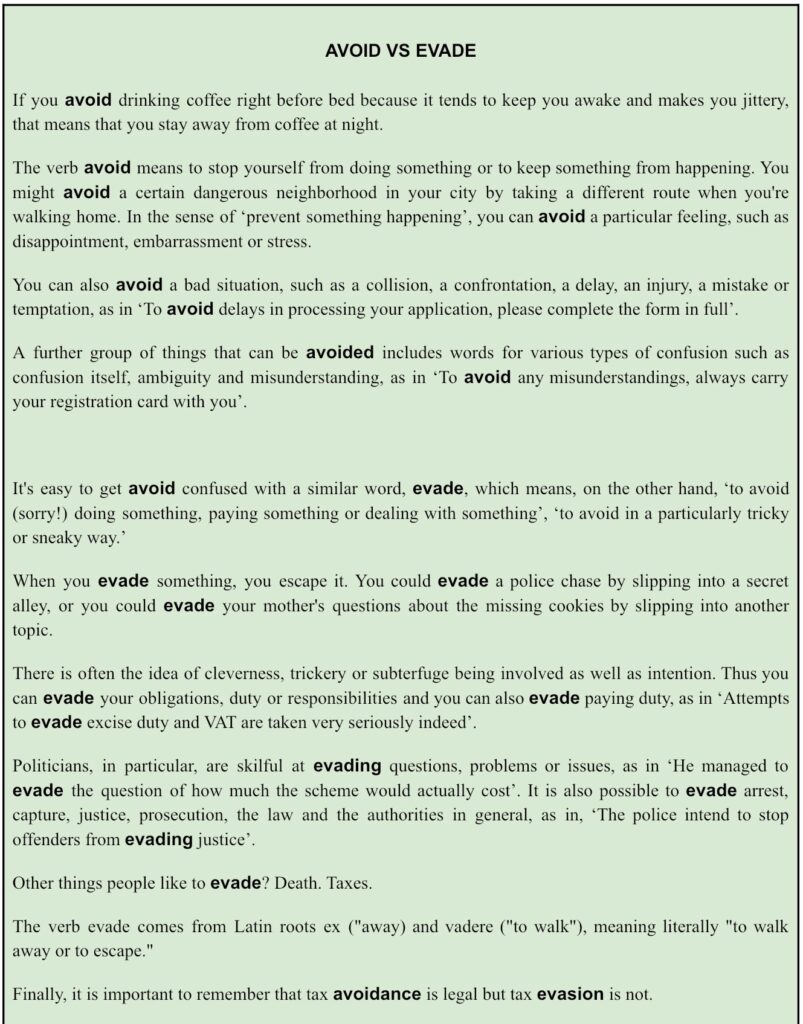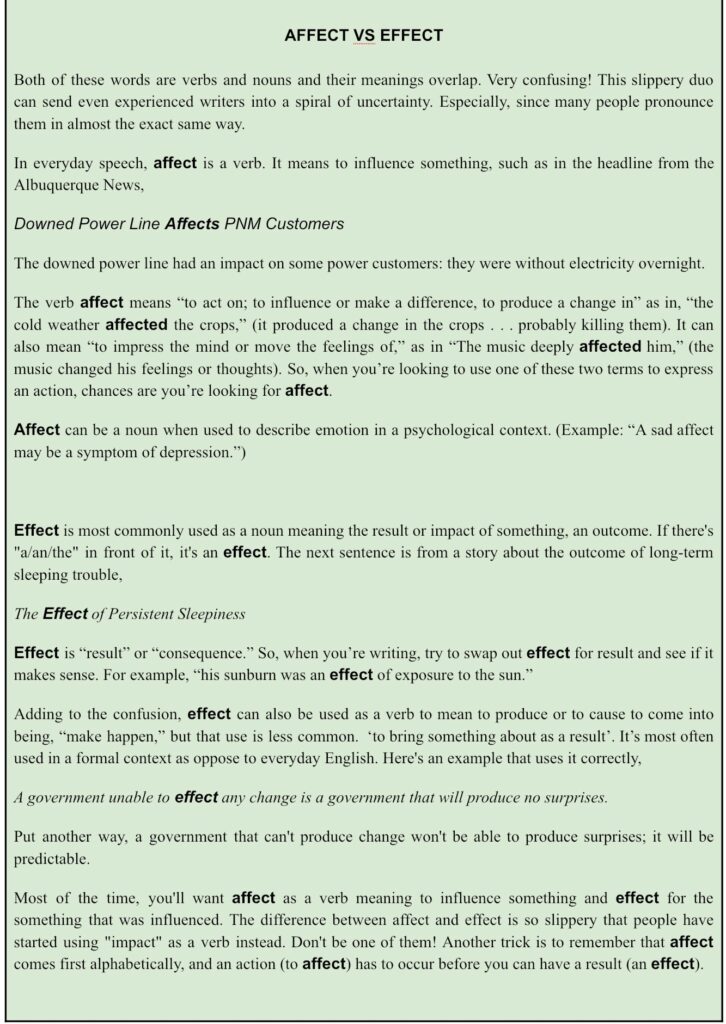ACTIVE VOCABULARY
- Study the Active Vocabulary List
- Continue learning with flashcards https://is.gd/UJedTh
- Upgrade your Vocabulary http://vocab.com/join/128D49J
- Study the Glossary below the table





GLOSSARY
EXAMPLES PRESENTED IN THE DICTIONARY
COMPRESS (v)
Flatten by pressure; squeeze or press.
- For Asia, the demographic changes that occurred gradually over 100 years in the West have been compressed into a few decades.
Squeeze or press (two things) together.
- She compressed her lips, and spoke with conviction.
Express in a shorter form; abridge.
- The agenda can be compressed into nine critical questions.
COMPRESSION (n)
The action of compressing or being compressed.
- Lossless data compression is used for data that must not be changed even a single bit.
CONFORM (v)
Comply with rules, standards, or laws.
- The changes were introduced to conform with international classifications.
Behave according to socially acceptable conventions or standards (of a person).
- People are defined as illiterate when they do not conform to a set of cultural criteria defined by the ruling elite of a particular society.
Be similar in form or type; agree.
- At a press conference, he was asked if his thinking as a scientist could conform to the thinking of a politician.
CONFORMITY (n)
Compliance with standards, rules, or laws.
- The goods were in conformity with the contract.
Behaviour in accordance with socially accepted conventions.
- The moral framework implies conformity to ideals of right human conduct.
Similarity in form or type; agreement in character.
- The changes are intended to ensure conformity between all schemes.
CONFORMIST (n)
A person who conforms to accepted behaviour or established practices.
- There is good evidence that instead of being passive conformists, Americans are extremely skeptical of anything their government says.
CONFORMIST (adj)
Conforming to accepted behaviour or established practices; conventional.
- But sometime in the past 40 years, Western society decided that deferential, ordered and conformist societies cramped creativity and personal expression.
CONFORMISM (n)
A term used to describe the suspension of an individual’s self determined actions or opinions in favor of obedience to the mandates or conventions of one’s peer group, or deference to the imposed norms of a supervening authority.
- It’s one of those untransportable American plays that, in rejecting social conformism and political correctness, ends up celebrating anything dysfunctional.
DECRY (v)
Publicly denounce.
- The group decried the lack of critical press treatment in this country.
DELIBERATE (adj)
Done consciously and intentionally.
- Genocide is the deliberate and preplanned attempt to wipe out a particular race of people.
Careful and unhurried.
- The introduction of a national ID card should be careful and deliberate, not something done in excess haste.
Fully considered; not impulsive.
- It was this committee that took the deliberate decision that the coronation of Charles II would be conducted as if the previous ten years had not happened.
DISGUISE (v)
Give (someone or oneself) a different appearance in order to conceal one’s identity.
- Police disguised themselves as tourists, secretly videoing visitors as they moved round the exhibition site.
Make (something) unrecognizable by altering its appearance, sound, taste, or smell.
- He asked that we disguise his voice and face, afraid of retribution by those who run the criminal enterprise.
Conceal the nature or existence of (a feeling or situation)
- Elizabeth was always good at disguising her feelings and keeping herself under control.
DISGUISE (n)
A means of altering one’s appearance to conceal one’s identity.
- His job was to create disguises, conjuring up such convincing new identities for agents that even their own families were not able to recognize them.
The state of having altered one’s appearance in order to conceal one’s identity.
- You may have seen the computer-enhanced pictures the police released which allegedly show what she might look if she was in disguise.
The concealing of one’s true intentions or feelings.
- Scarlet’s childish behavior was only a disguise; her true self was a woman of virtue, courage, honor, and determination.
DISTORT (v)
Pull or twist out of shape.
- Their faces were distorted with fear and anguish.
Give a misleading or false account or impression of.
- Many investors now distrust pension accounting because it distorts reported earnings.
Change the form of (an electrical signal or sound wave) during transmission, amplification, or other processing.
- The voice had been distorted with some sort of audio device.
DISTORTION (n)
The action of distorting or the state of being distorted.
- The program helps avoid damage, data loss or distortion.
A distorted form or part.
- The distortions turn dangerous zealots into icons.
The action of giving a misleading account or impression.
- The policies have to deal with the real world of interest groups, elections and media distortion.
Change in the form of an electrical signal or sound wave during processing.
- Even in clear skies, however, atmospheric distortion is a challenge.
EVADE (v)
Escape or avoid (someone or something), especially by guile or trickery.
- Many of the suspected murderers continue to evade police capture for months or even years.
Elude (someone) (of an abstract thing).
- He was sure sleep would evade him, with his mind still spinning fruitlessly on its search for information that wasn’t there.
Avoid giving a direct answer to (a question).
- Parliamentary question time is full of wonderful examples of extended verbs, conjunctions and prepositional phrases employed to evade answering a question.
Avoid dealing with or accepting (something unpleasant or morally or legally required).
- This is a matter of deliberate policy from management, who hope to evade some of their responsibilities for training and supporting workers and to cut costs.
Escape paying (tax or duty), especially by illegitimate presentation of one’s finances.
- She was sentenced on three counts of conspiracy to evade taxes.
Act contrary to the intention of (a law or rule), especially while complying with its letter.
- Thus the US and Canadian vessel owners re-registered their vessels under Japanese and other flags to evade the US and Canadian regulations.
EVASIVE (adj)
Tending to avoid commitment or self-revelation, especially by responding only indirectly.
- At Westminster, a series of written questions has produced singularly evasive answers.
Directed towards avoidance or escape.
- In the pursuit of this aim several attempts have to be made, which results in the surrounding traffic having to take evasive action.
EXTENT (n)
The area covered by something.
- The universe is infinite, both in the number of atoms and in the extent of space.
The size or scale of something.
- They claim the Government is covering up the true extent of the disease outbreak.
The particular degree to which something is or is believed to be the case.
- Everyone will have to compromise to some extent.
FUEL (n)
Material such as coal, gas, or oil that is burned to produce heat or power.
- As around half of Australia’s primary energy is derived from coal, a better alternative could be the production of liquid fuels from coal using the South African Sasol processes.
Short for nuclear fuel.
- Currently China stores spent fuel in water tanks inside the plants.
Food, drink, or drugs as a source of energy.
- Food is not only fuel, but it can also have a powerful psychological effect.
A thing that sustains or inflames passion, argument, or other intense emotion.
- His comments are certain to add fuel to the already fiery debate between councils and the Government over urban planning in the region.
FUEL (v)
Supply or power (an industrial plant, vehicle, or machine) with fuel.
- Most US power plants are fueled by coal, fuel oil, and natural gas, the only fuels available in sufficient quantities to meet the demand.
Cause (a fire) to burn more intensely.
- Dry conditions and wind gusts of up to 40 miles per hour are fueling the fires.
Sustain or inflame (an intense feeling).
- His resignation fuelled speculation of an imminent cabinet reshuffle.
INHIBIT (v)
Hinder, restrain, or prevent (an action or process)
- All the problems act to inhibit the process of renewing country’s economic infrastructure.
Prevent or prohibit (someone) from doing something.
- The earnings rule inhibited some retired people from working.
Make (someone) self-conscious and unable to act in a relaxed and natural way.
- You are easily inhibited by setbacks, and you seek projects that don’t require minute accountability.
INHIBITED (adj)
Unable to act in a relaxed and natural way because of self-consciousness or mental restraint.
- She was inhibited and self-conscious about her accent when she first arrived in this country.
INHIBITION (n)
A feeling that makes one self-conscious and unable to act in a relaxed and natural way.
- A good alternative is vacation class — martial arts, music, dance — which colours a child’s life, enhancing confidence and wiping away diffidence and inhibitions.
The action of inhibiting a process.
- There is no reason to think other large single-currency areas, such as China, pay any smaller cost in terms of overall GDP inhibition and regional disparity.
INTRUDE (v)
Put oneself deliberately into a place or situation where one is unwelcome or uninvited.
- People do not like the idea of the government intruding on their private lives.
Enter with disruptive or adverse effect.
- There are concerns that some of the Government’s proposed changes will intrude on the independence of Australian universities.
Introduce (something) into a situation with disruptive or adverse effect.
- To intrude political criteria into military decisions risks reducing efficiency.
INTRUSION (n)
The action of intruding.
- We in the UK hold certain freedoms sacred — freedom of speech, freedom of movement, freedom of religious belief, freedom from intrusion into our private lives.
A thing that intrudes.
- Traffic generates noise and pollution, and is an intrusion for many areas.
INTRUSIVE (adj)
Causing disruption or annoyance through being unwelcome or uninvited.
- Hardly anyone responded, put off by either the slightly intrusive questions or perhaps my impatient demand for a quick response.
OBSCURE (adj)
Not discovered or known about; uncertain.
- Even now, a hundred years on, the precise cause and surrounding circumstances of Oscar Wilde’s death remain obscure, shrouded about with mystery.
Not important or well known.
- That kind of data may seem obscure and unimportant, but it’s a useful tool for researchers and insurance companies wanting to know long-term hurricane trends.
Not clearly expressed or easily understood.
- If the communication gap is too wide, the message is too obscure for people to understand.
Hard to define; vague.
- Most of the people are scared stiff of entering the political arena on their own but eager to do so hidden under some obscure umbrella.
OBSCURE (v)
Keep from being seen; conceal.
- The sun was obscured by high, grey cloud, its disc appearing at once flat and lifeless.
Make unclear and difficult to understand.
- The debate has become obscured by conflicting ideological perspectives.
Keep from being known.
- Exploring a subject that has involved controversies and sensitivities, their research revealed an important story that was obscured for 50 years.
REVEAL (v)
Make (previously unknown or secret information) known to others.
- Hastie was previously reluctant to reveal details of the contracts until he was sure the company had a secure future.
Cause or allow (something) to be seen.
- Some years ago, an advisor tried to get Hillary Clinton to soften her image by publicly revealing some hitherto unknown weakness.
Make (something) known to humans by divine or supernatural means.
- People as well as objects may reveal the presence of the supernatural.
REVELATION (n)
A surprising and previously unknown fact that has been disclosed to others.
- The cascade of recent revelations has left human rights groups understandably alarmed.
The making known of something that was previously secret or unknown.
- The Prime Minister’s revelation of a possible Government ban on public smoking has been welcomed by Swindon health watchdogs.
Used to emphasize the remarkable quality of someone or something.
- The Van Gogh Museum is a revelation, even for people who hadn’t previously considered themselves huge lovers of his work.
The divine or supernatural disclosure to humans of something relating to human existence.
- Sunlight, for instance, often stands in for divine grace or revelation.
SPIN (v)
Turn or cause to turn or whirl round quickly.
- I spun around quickly, hiding the piece of paper behind my back.
Give a sensation of dizziness (of a person’s head).
- My head is spinning, and I feel a huge sense of responsibility for my colleagues.
Draw out and twist (the fibres of wool, cotton, or other material) to convert them into yarn, either by hand or with machinery.
- The textile workshop spins local wool and uses natural dyes to produce an array of knitted, crocheted, and woven items.
(of a spider or a silkworm or other insect) produce (gossamer or silk) or construct (a web or cocoon) by extruding a fine viscous thread from a special gland.
- Spiders spin their webs in zero gravity.
Give (a news story) a particular emphasis or bias.
- Ministers may now find it difficult to use the programme to spin stories in their favour.
SPIN (n)
A rapid turning or whirling motion.
- Mr. Callaghan has taught me how important spins and connecting steps are in addition to high quality jumps in a program.
Revolving motion imparted to a ball in a game, especially cricket, tennis, or snooker.
- The racket enables the player to impart more spin to the ball.
An uncontrolled fast revolving descent of an aircraft, resulting from a stall.
- He tried to stop the plane from going into a spin.
A brief trip in a vehicle for pleasure.
- We continued our driving tour with a little spin through downtown and up Yonge Street before we turned east on Bloor Street.
The presentation of information in a particular way; a slant, especially a favourable one.
- He tried to put a positive spin on the president’s campaign.
EXAMPLES PRESENTED IN THE UP-TO-DATE AUTHENTIC CONTEXT

- Azahálea Solís of the Civic Alliance opposition group said the amnesty “attempts to disguise impunity for those who ordered, directed or participated in murders of citizens.”
- “These two countries along with other authoritarian adversaries and their proxies will likely use deep fakes as part of disinformation campaigns seeking to distort the reality of American audiences and the audiences of American allies.”
- There is a key difference between framing issues and facts in a positive but politically-slanted light and engaging in a systematic campaign of distortion and disinformation designed to deceive the American public.
- While businesses in other areas highlight finance and skills shortages as factors inhibiting growth, nearly one-third of firms in York and North Yorkshire said inadequate transport infrastructure was a major stumbling block.
- Iran’s use of commercial entities such as Mahan Air to perpetuate terror and violence will be greatly inhibited by Germany’s decision to deny future landing rights to the Iranian airline.
- A growing number of voices, including the UK’s trade union body want businesses to cut the standard working week from five days to just four. Still some employees worried about their workload being compressed into four days, and part-time workers were concerned that a new working week would mess up their childcare or other arrangements.
- Bill Clinton punctuated speeches with a fist, topped with a thumb extended, compressing his lips inward until they disappeared.
- Running for a second term, Franklin Roosevelt decried the reactionary business and financial leaders who opposed every part of the New Deal to battle the Depression.
- The backlash began years ago in authoritarian countries, in developing countries that saw human rights as an affront to their traditions and as a mask for imperialist goals, and in highly religious countries. These countries advanced interpretations of human rights law that conform with their values or interests but made little headway against dominant elite opinion.
- The ministry said that in welcoming De Grazia into its Caracas residence, Italy was operating “in full conformity with diplomatic conventions”.
- In Scandinavia, the dominant conformist zeitgeist is called the Law of Jante, a reference to a fictional Danish town that enforces being ordinary in every possible way.
- The descendants of Genghis Khan implemented their own management system based on totalitarian values, the absence of the institution of human rights, complete conformism and suppression of political dissent.
- The current system requires prosecutors in most cases to exhaust all obvious investigative methods for identifying leaks before seeking to intrude on a journalist’s free-speech rights,” Mr. Solomon reports.
- The cyber intrusions are expected to continue disrupting ill-prepared local governments and public services, with devastating financial impacts and potentially life-threatening consequences, experts warned.
- Concerned that some new surveillance technologies may be too intrusive, San Francisco became the first U.S. city to ban the use of facial recognition tools by its police and other municipal departments.
- JoAnn Morgan told the Nasa website: “It was just meant to be for me to be in the launching business. I’ve got rocket fuel in my blood.”
- Mendez said her vote in favor of the executive order was voicing her support for the immigrant community, particularly given that agriculture and migrant workers fuel much of Yakima’s economy.
- Thunberg, meanwhile, is phenomenally articulate, well-informed and self-assured, holding her own in conversation with an elected official nearly twice her age and speaking in deliberate, thoughtful English.
- There was no breach of sensitive data files, but the attacks in which somebody deliberately overwhelmed the Avon Public Schools system in Connecticut still proved costly.
- Edelstein’s initiative, however, was treated with skepticism by analysts and Netanyahu’s rivals, who termed it political spin and another way for the formidable leader to deflect from his legal woes to stay in office.
- Voters electing seven of nine council members this fall should note City Hall’s current priorities and how it spins policies favoring special interests over current residents.
- Gomes, a former member of the parliament’s special committee on tax evasion, thinks Luxembourg police and tax authorities do not have adequate access to the data collected by the logistics firms working in Le Freeport. “It is a major scheme to evade paying taxes, to avoid money-laundering controls,” she alleges.
- Mr. Netanyahu said in the past that he would not promote a new immunity law. But when pressed in a television interview days before the election, he was more evasive, saying only that he was currently “not dealing” with the issue.
- Every elected official – Democratic, Republican and independent – faces criticism to some extent.
- People are notoriously bad at evaluating the extent to which they understand things — a phenomenon referred to as the “illusion of explanatory depth.
- Fox News, and the right-wing media in general, frame reality for their audiences by focusing on some stories and excluding others. If you are watching Sean Hannity, for example, you are constantly hearing about Hillary Clinton’s emails. Or with the Mueller report, there will be a focus on some obscure people who worked for the FBI.
- Last year, the United States Citizenship and Immigration Services dropped the phrase “nation of immigrants” from its mission statement. That phrase, like most foundational myths and more than some, obscures much of the country’s history: the first immigrants would more accurately be described as settler colonialists, who brought Africans here as slaves.
- The breach, which the credit bureau Equifax revealed in September 2017, included Social Security and driver’s license numbers and was one of the most severe exposures of Americans’ personal data.
TOPIC VOCABULARY
- Study the Topic Vocabulary Words and examples which illustrate their usage
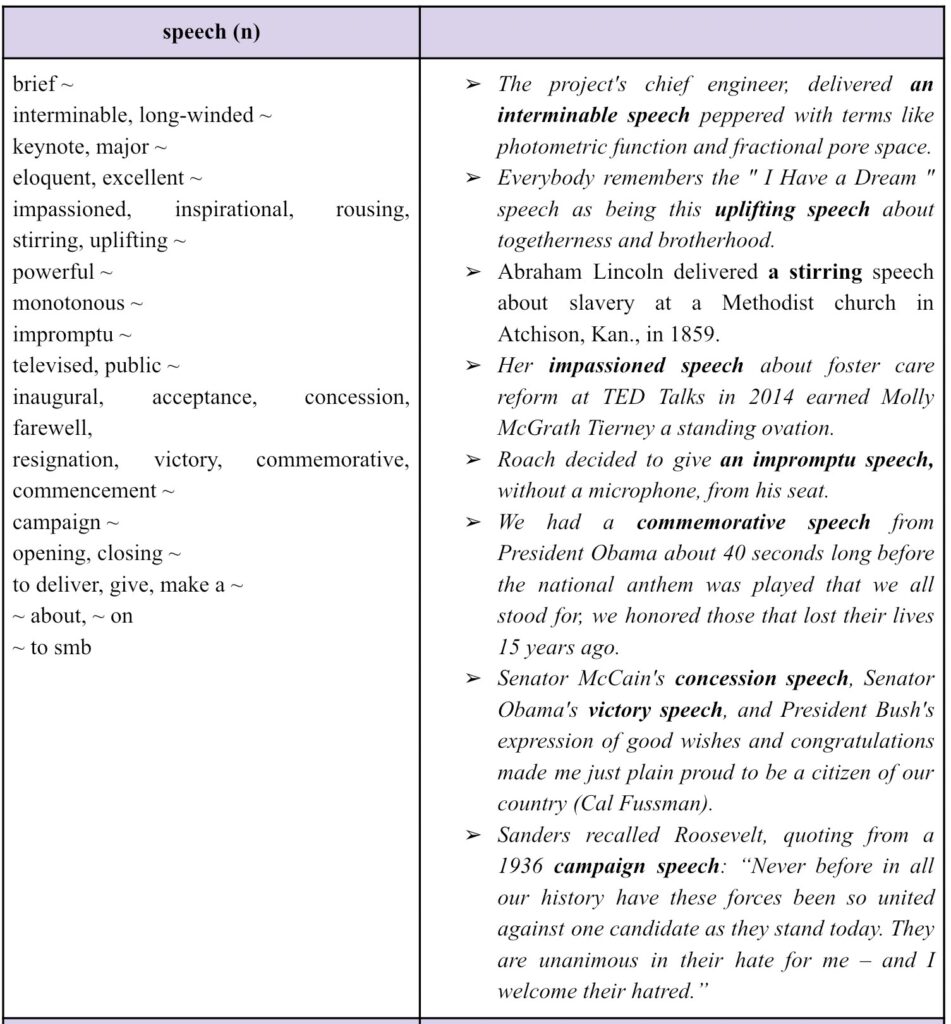
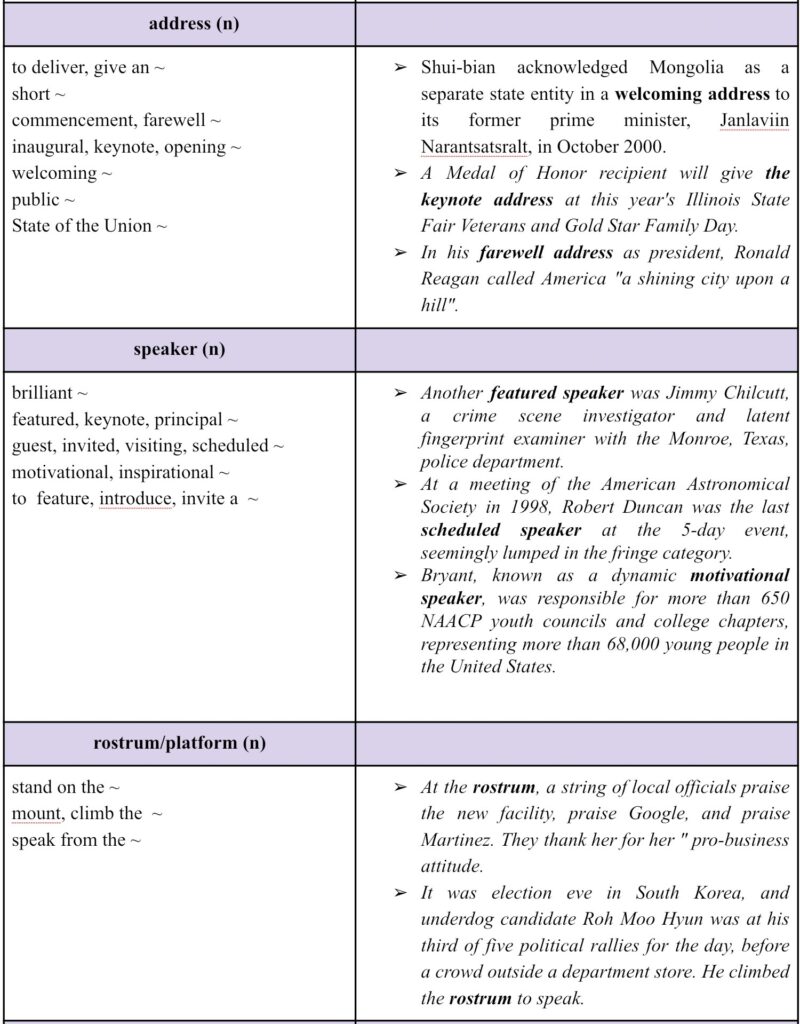
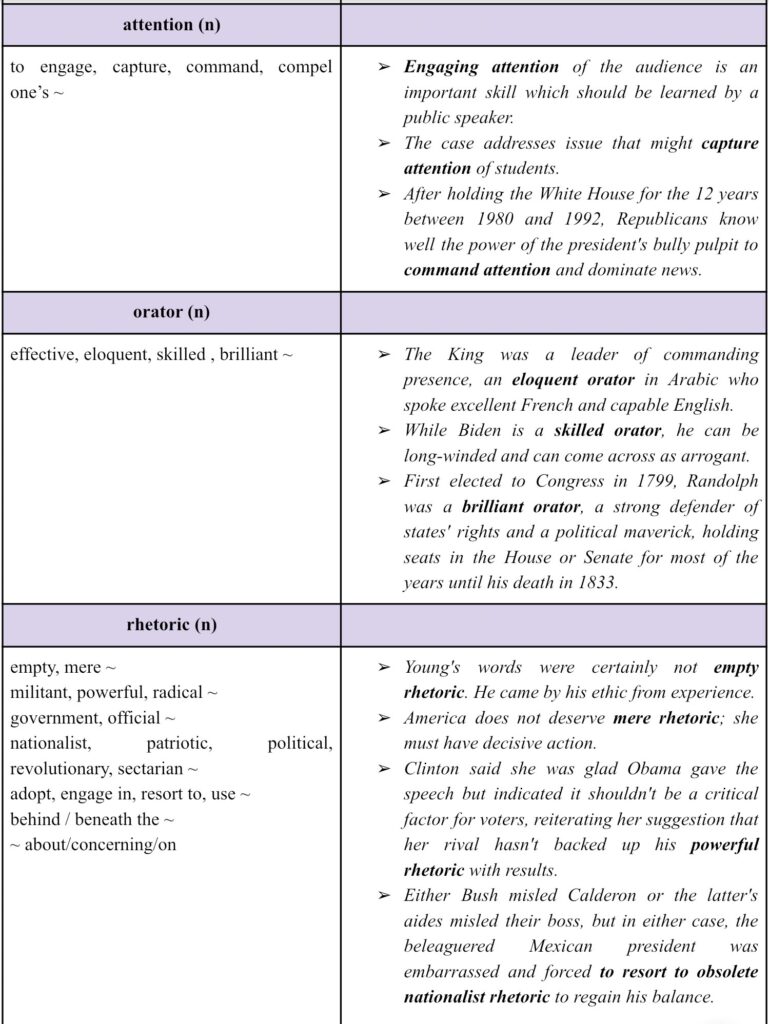
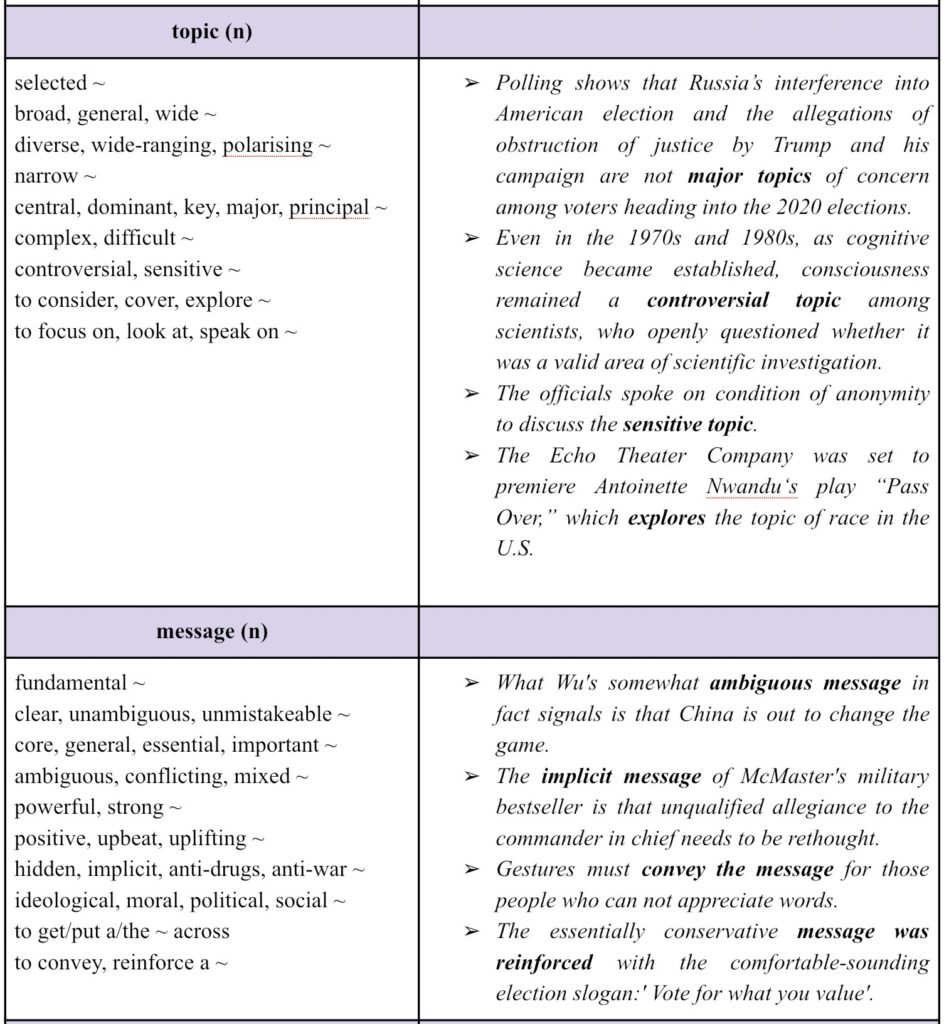
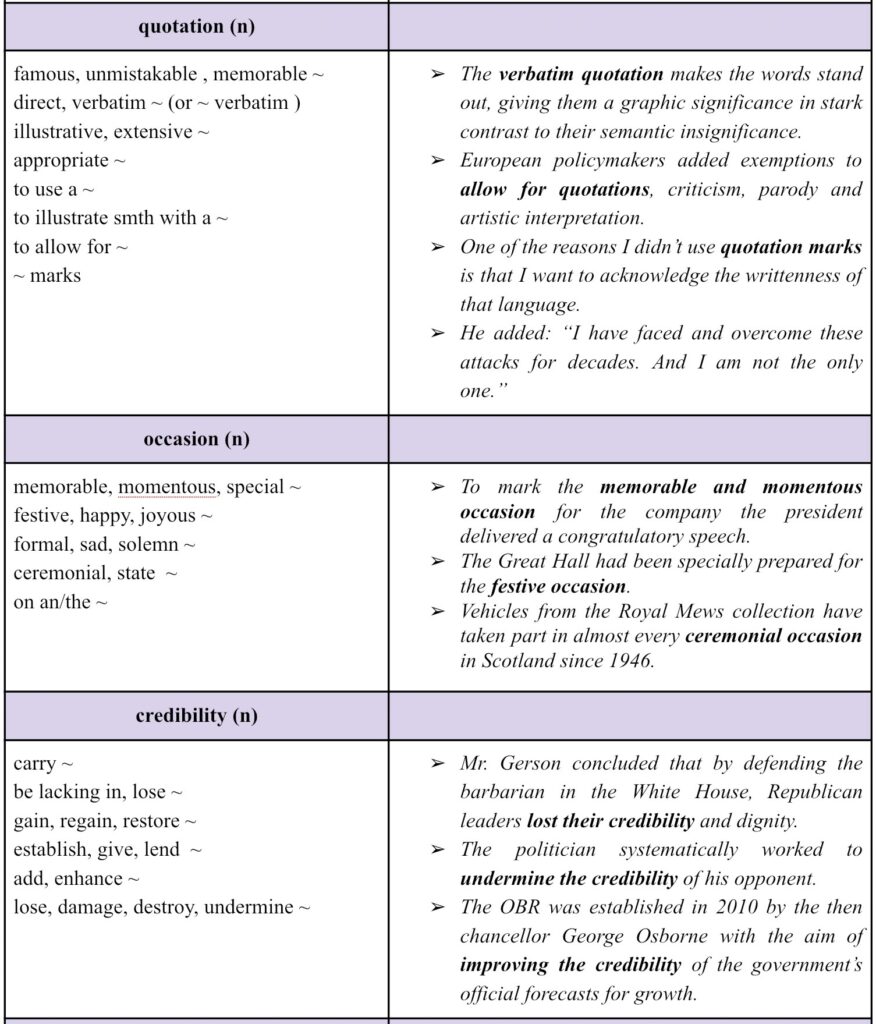
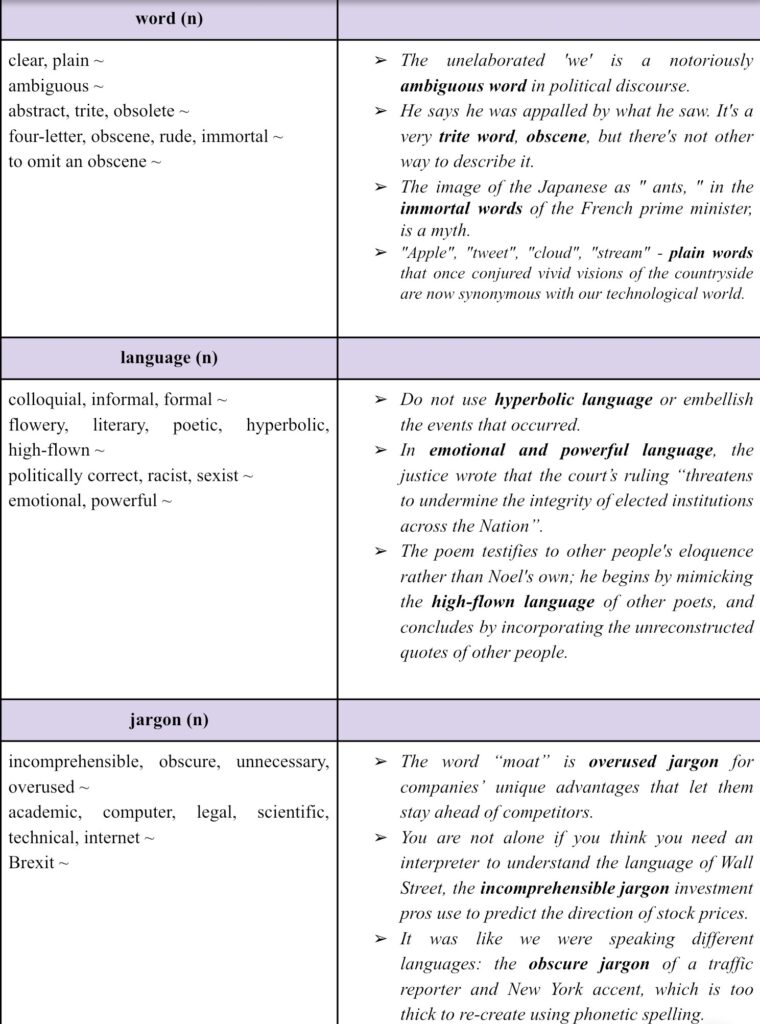
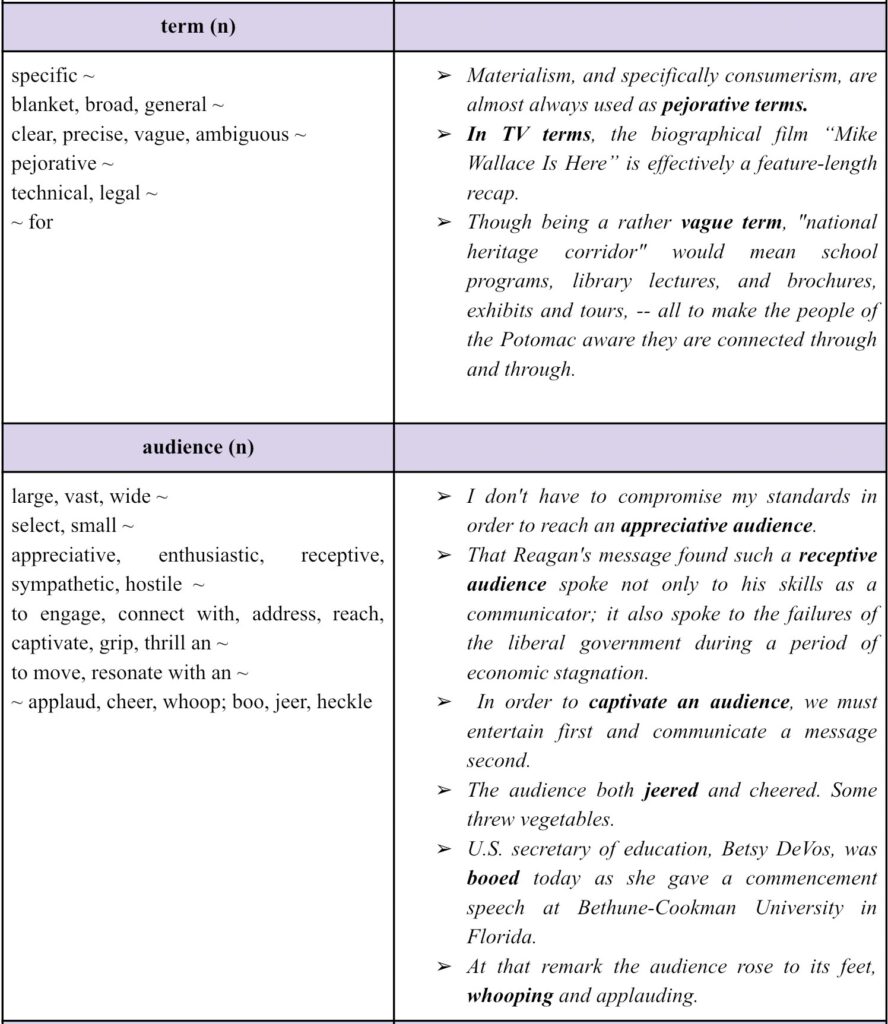
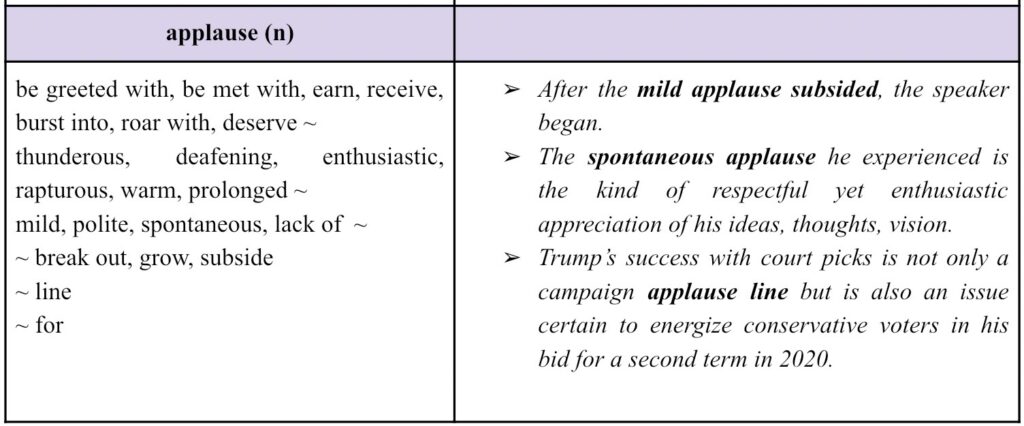
TOPIC VOCABULARY BANK
SPEECH/ ADDRESS
- In her last major speech as PM, Theresa May said that the growth of an «uncompromising absolutism» in the UK and global politics was leading to a political culture based on «winners and losers».
- In a wide-ranging speech at the Royal Institute of International Affairs, Theresa May warned about the threat to the international order from populism and authoritarianism, and defended multilateral agreements such as the Paris Climate Accord and Iran Nuclear Deal, shunned by the US.
- He gave a brief speech and led a procession of handshakes.
- Days after bombing with a long-winded speech at the 1988 Democratic convention, Clinton joked about it on the Johnny Carson show.
- Donald Trump unveils his foreign policy agenda in a major speech.
- It was an excellent speech as he covered a lot of areas, had to be conceptual because of the time constraints.
- Tillman signed autographs, gave an inspirational speech and interacted with the kids.
- King gave the people of The Kingdom a rousing speech about how their bravery would lead to victory.
- Then someone handed a microphone to Marjorie and she started a really powerful speech about how the Olympics could be the end of the line, a climax for a career, the endpoint, the highest point for a career, but it could also be a beginning point.
- The Air Force prefers that drones be called Remotely Piloted Aircraft; but this linguistic battle has already been lost: New Oxford American Dictionary now defines drone as — in addition to a male bee and monotonous speech — » a remote-controlled pilotless aircraft or missile.”
- The politician is living abroad and communicates with his followers through the occasional televised speech, press statements and Twitter.
- Tom Wheeler, used his final public speech to make a closing argument for maintaining net neutrality.
- He’s going to make his resignation speech. He’s basically going to say, I quit.’ But it’s not that easy.
- The progress on controlling the stammer allowed Prince Albert to deliver the 1927 opening speech to the Australian Parliament in Canberra.
- In his welcoming address from the IRS TRC national event in Montreal, Mohawk elder John Cree drew upon the metaphor of the journey to express the need for emotional and physical integration.
RHETORIC
- The country does not deserve mere rhetoric; she must have decisive action.
- Lula led strikes against foreign firms and denounced their actions with fiery, radical rhetoric.
- Government rhetoric included land reform and promotion of an old comparative advantage of the Northeast.
- Understanding nationhood involves looking beyond official rhetoric to see what these visions mean to local communities.
- The ideal image of the social order in nationalist rhetoric is one that recognizes the responsibility of government to ensure the welfare of the common people, particularly the peasantry, and this too is compatible with villagers’ understandings of justice and authority.
- He explicitly has rejected the doctrine of American exceptionalism — and this is not mere rhetoric.
- The tensions found expression in an increasingly nationalist and militant rhetoric on the part of some activists.
- The lack of ideological coherence and Garcia’s penchant for radical rhetoric and grandiose gestures made democratic reform impossible.
- Government actions have created expectations encouraged by government rhetoric regarding worker input in managerial decisions that have in large part failed to materialize.
- There was a significant gap between official rhetoric and how these rules were applied.
- People look at the rhetoric during the campaign, the nationalist rhetoric, tough language about immigrants, about Muslims.
AUDIENCE/ SPEAKER
- Shon Hopwood was invited to be a guest speaker before students for a lecture series at Arkansas State University.
- A conservative talk radio proliferated and the influence of Fox News on intra-GOP politics crystallized, Republican candidates increasingly turned their attention, and their rhetoric, toward that narrower audience.
- The newspaper reports that one of the group’s members explained the project to a sometimes hostile audience.
- Those young people are tomorrow’s audiences – and their parents would be there too.
- It’s a two-way street — journalism needs to be tougher and the audience needs to demand it and want it.
- Many in the audience laughed mockingly when she told them that her group wants what is best for the area.
- Our culture is changing, but what Fox News audiences don’t understand — or deliberately refuse to admit — is that culture is never static and is always changing.
- Without a receptive audience, any speech act is rendered meaningless.
- “The governor’s moral authority and credibility to lead are completely gone,” Fortuño said.
- Her remarks were met with applause from Indonesia’s parliament.
- “Both parties are using this as a wedge issue, because if they solve it, they’ve got nothing to talk about to rile you up,” he said, to thunderous applause.
- After getting some mild applause from the audience, the politician was then asked if he would ever support his rival if the latter ran for office in the future.
TOPIC/ MESSAGE
- For many on the left, however, his highly conservative views on principal topics including welfare, climate change and abortion are beyond a joke.
- Themes include integrity, perseverance and teamwork, and there are clear messages about following your dreams, getting by with a little help from your friends and facing bullies.
- The message was otherwise fairly clear: anything other than a rate cut at the September ECB meeting would be a shock.
- Mr. Menendez told The Washington Times following the vote that even if the bill fails to become law, the anti-Saudi moves on Capitol Hill are sending “an incredibly important message”.
- The recent general message from the Fed seems to be that it’s more about downside risks to growth rather than the economy being already weak.
- Naval War College, said the new white paper did not outline qualitatively different strategies but sent a political message.
LANGUAGE/WORDS
- Joe Biden’s references tend to skew older, with quotations from Adlai Stevenson and decades-old war stories about the Senate.
- Clear words were a matter of practical rather than juridical significance.
- The court will not read an ambiguity into clear words by giving them a strained or tortured meaning. Clear and plain words will be given their clear meaning.
- Incidentally, the waffles served at breakfast have nothing to do with the verb, to waffle, which comes from an obsolete word » waff, » meaning to yelp.
- A political theorist traces the shift from “responsibility-as-duty” to “responsibility-as-accountability” — in other words, when responsibility was no longer about looking after those in need and instead about rewarding the good and punishing the bad.
- True to his word, the former special counsel resisted saying anything that might be used as a political weapon, refusing to even read sections of his report aloud.
- Conservative MP Jacob Rees-Mogg began his new role as the leader of the House of Commons by issuing a style guide to all staff members in his new office. His rules, according to ITV News, include banning his staff from using words such as «very», «lot» and «got» when writing to other MPs and members of the public.
- If the language someone uses is perceived as being a potential hate crime, it is right to investigate the case.
- Social anthropologists employ comparatively few technical terms which do not form part of the ordinary colloquial language to which they have been accustomed since childhood.
- The spoken word has vast opportunities for variety by the use of tone, stress, inflexion and in the way that our words are delivered. Accent, dialect and the register of our voice, whether we use formal or informal language, all add to the variety, as does our use of idioms and colloquialisms.
- Theresa May said that «words have consequences»: «Ill words that go unchallenged are the first step on a continuum towards ill deeds — towards a much darker place where hatred and prejudice drive not only what people say but also what they do.» She conceded she had been clumsy in her use of language on sensitive issues, such as when she claimed freedom of movement had allowed EU citizens to «jump the queue» to enter the UK despite being legally entitled to do so. Ex-Conservative chair Baroness Warsi said the outgoing PM had «systematically failed to challenge xenophobic and racist language» used by party members about British Muslims.
- The resulting book, “As We Forgive Our Debtors,” made a splash in part because it was written in accessible prose instead of academic jargon.
- “The current Step-Down Program is a system of vague standards, contradictory goals, and malleable jargon used to conceal what is nothing more than an indefinite or permanent solitary confinement regime,” the lawsuit reads.
- He mocked the scientific establishment’s jargon by giving his inventions jokey names.
- Such “easy” monetary policy, to use the jargon of the markets, provides a helping hand to the economy and caps returns on bonds, the main investment alternative to stocks.
- The phrase «absolute unit» is internet jargon, meaning a large, muscular person or thing.
- Procedures are described in medical jargon and abbreviations.
- The politician was joking to attack his political opponent for destroying evidence or, in legal jargon, obstructing justice.
- Inside the U.S., «America» and «American» typically refer to the United States. But outside the U.S., both terms are also used in reference to other countries in North America, Central America, South America and the Caribbean.
- A decade ago, you didn’t hear any Democrat talking about systemic racism. You didn’t hear any Democrat using terms like ‘institutional racism’.
PHRASAL VERBS
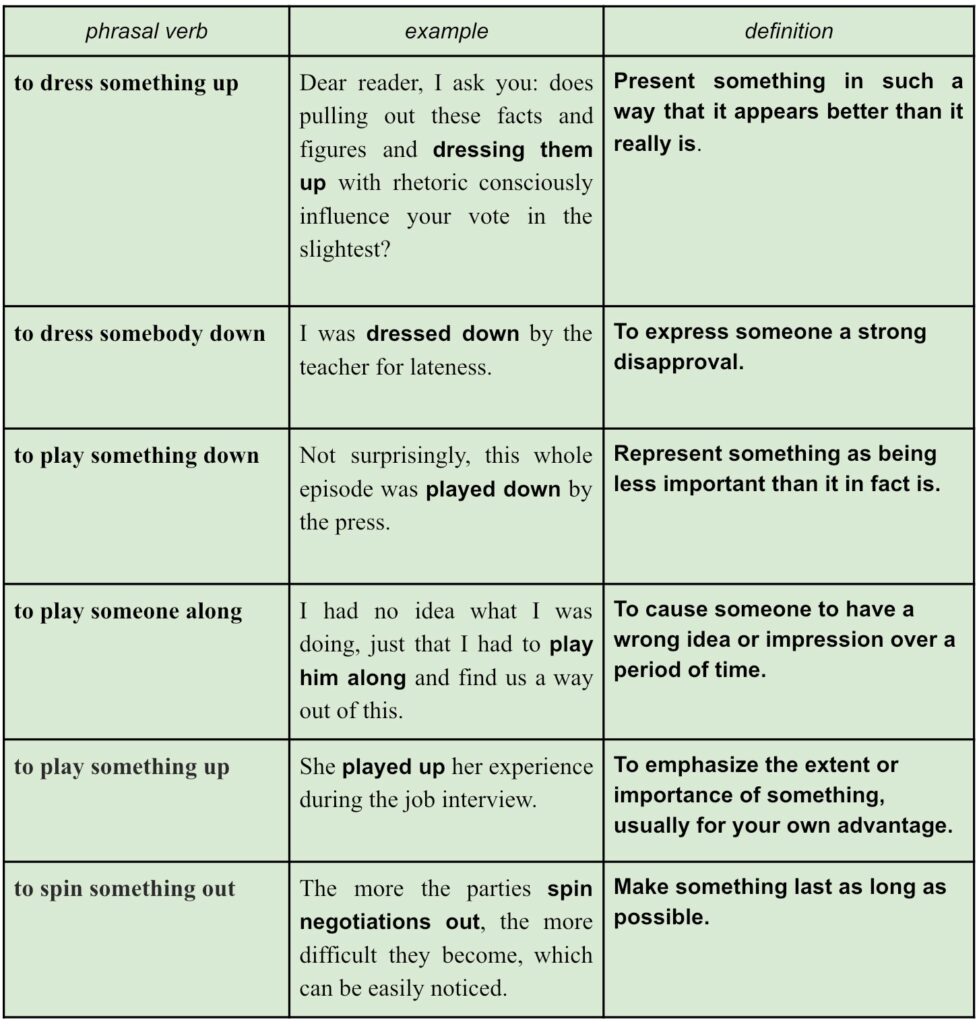
IDIOMS
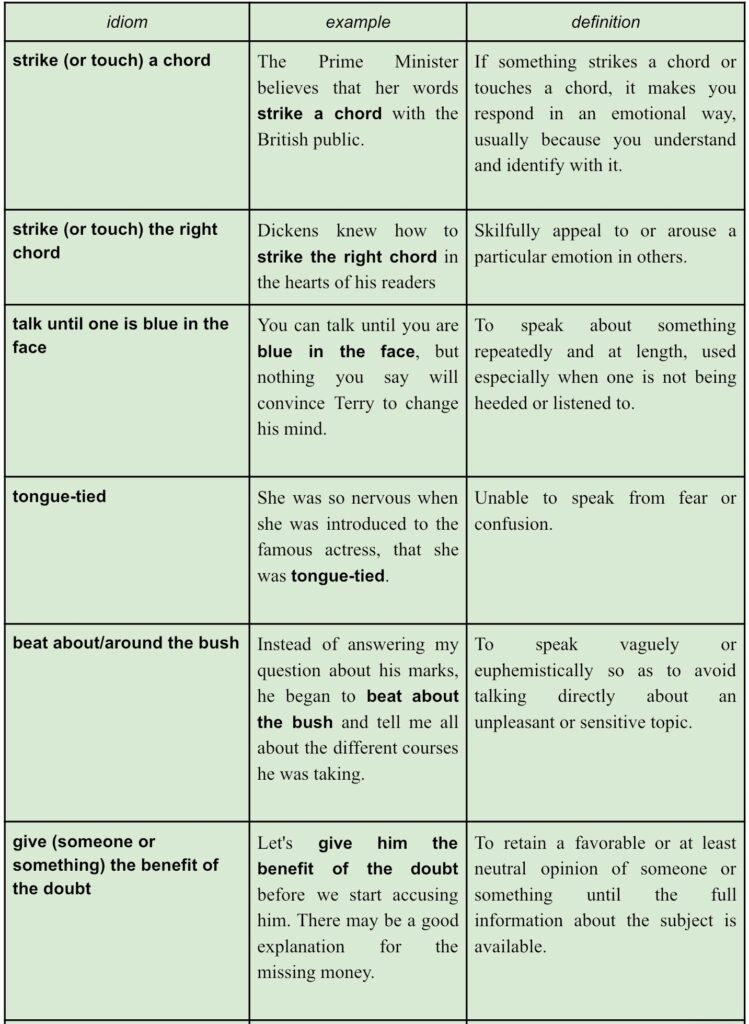
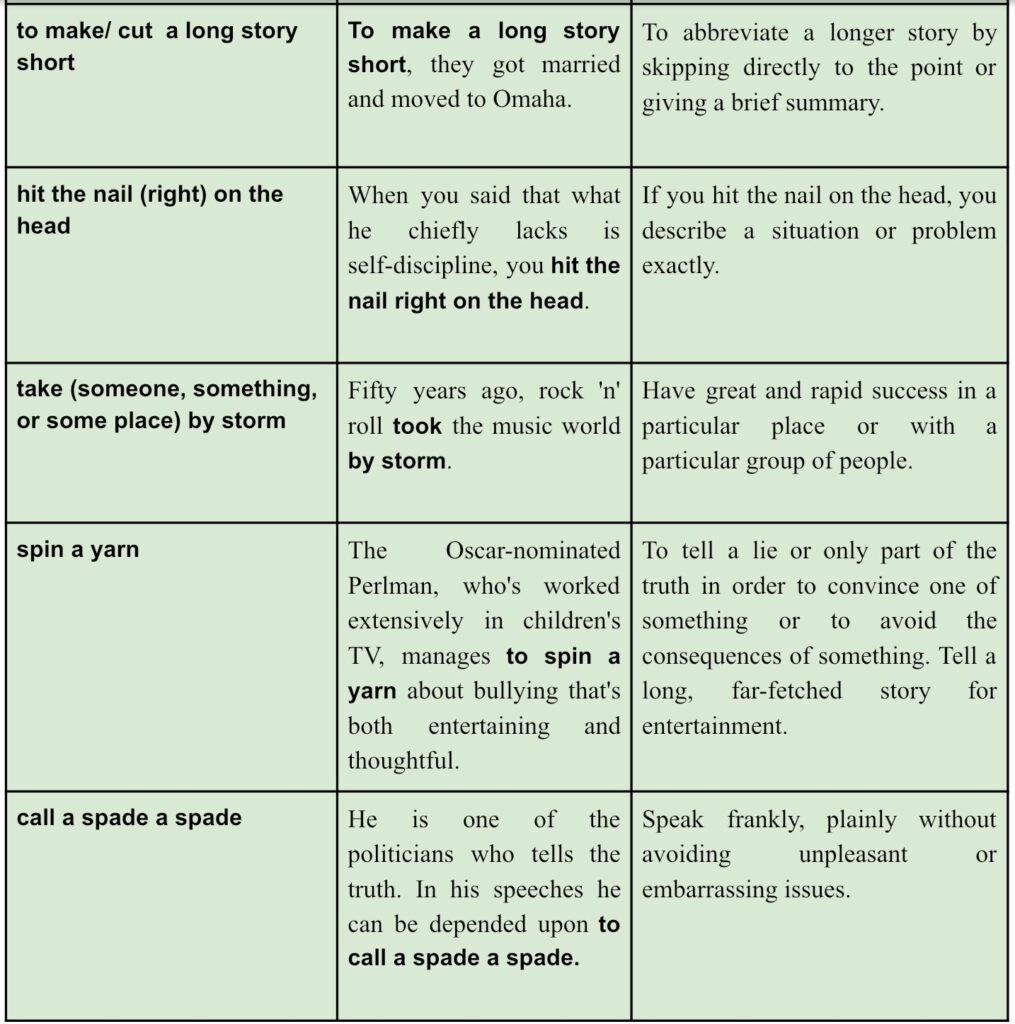
Etymology
strike/ touch a chord (the right chord)
When we use this phrase we generally mean that something provokes a memory or evokes some form of an emotional response.
The literal meaning of the phrase, not unsurprisingly, comes from the world of music. When the key of a piano is pressed and, indeed, when a note on a stringed instrument is played, the string vibrates at a certain rate. This vibration can cause other strings to vibrate too, usually those whose harmonics are most in common with the note played, a phenomenon known as sympathetic vibration or sympathetic resonance.
tongue-tied
Originally “tongue-tied” was a metaphorical expression that described a specific physical abnormality, when a thick or long tissue connects an underside of the tongue to the base of the mouth. Some children actually have this medical condition which has a lot of side effects such as a delayed speech. Obviously, a tied tongue which makes it difficult to speak clearly has come to a more general meaning of “struggling to express yourself”.
beat around/ about the bush
The origin of the phrase is quite literal. While hunting, one person would go beat the bush to scare the birds into the air so that someone else could shoot them.
The phrase is very old, from at least the 1400s in the form if beat the bushes. In bird hunts some of the participants roused the birds by beating the bushes and enabling others, to use a much later phrase, to ‘cut to the chase’ and catch the quarry in nets. So ‘beating about the bush’ was the preamble to the main event, which was the capturing of the birds.
The progression of the phrase is quite logical. Beating around a bush is not as effective as beating the bush. This exact wording is noted in the late 1500s.
until one is blue in the face
Until one is blue in the face means until one is totally exasperated; to argue, shout or talk to someone, especially trying to persuade them to do something, until one is totally spent. The idea is of someone who is expending extreme effort in talking until he is so out of breath he turns blue from lack of oxygen. Interestingly, the phrase as rendered in the 1820s was originally until one is black and blue in the face. The color black was dropped from the idiom by the 1860s, when the idiom became until one is blue in the face.
take by storm
Make a vivid impression on, quickly win popular acclaim or renown, as in The new rock group took the town by storm. This usage transfers the original military meaning of the phrase, “assault in a violent attack,” where to storm meant to lay siege to a fortified position, to more peaceful endeavors in Mid-1800s. By the late nineteenth century the term had been extended to mean winning renown or popular acclaim. Thus Augustus Jessop wrote (The Coming of the Friars, 1889), “The Franciscans . . . were taking the world by storm.”
to cut/ make a long story short
Get to the point — leave out details. Leave out parts of the story to make it shorter. To bring a story to an end.
This expression has been used since the 1800s. Although the idea of making something very long shorter is ancient, the precise phrase here, dates back only to the 1800s. Henry David Thoreau played on it in a letter of 1857: “Not that the story need to be long, but it will take a long time to make it short.”
give the benefit of the doubt
There isn’t really any figurative or transferred use here of either word. When you give someone the benefit of a doubt, it means that any doubt about the truth or the correct interpretation of the facts lessens the fault that can be imputed to the party in question, thereby benefitting him by improving his case while weakening that of his accusers or opponents.
OED: «Phr. to give (an accused person) the benefit of the doubt: to give a verdict of Not Guilty where the evidence is conflicting; to assume his innocence rather than guilt; hence in wider use, to incline to the more favourable or kindly decision, estimate, or the like.
hit the nail on the head
Hit the nail on the head is one of those idioms whose meaning is fairly easy to tell. It means to be exactly correct, especially in regards to a statement, or to have summed up a situation perfectly. Basically, to hit the nail on the head means to be on point, to hit the mark. This expression is especially used when someone is describing the cause of a problem or situation.
Hit the nail on the head is a reference to carpentry and hitting the head of a nail squarely or ‘true.’ A good carpenter can drive a nail with only two or three swings of the hammer, but his success depends on his accuracy. If he didn’t hit the nail squarely on the head every time, and instead hit it sideways, he would be inefficient and a much less successful carpenter. So, a carpenter’s ability to “hit the exact point” is similar to the idiom: To be exactly on point, and correct.
This idiom is quite old and has existed in English since at least the early 1700’s, and probably since the 1600’s. There is no way to trace it to a particular source, but it has probably been a part of the language for nearly as long as there have been carpenters and nails. Many languages share similar idioms.
to spin a yarn
To spin a yarn means to tell a story, usually a long, imaginative, colorful and unlikely story. A yarn is a long story told primarily as a form of entertainment, not as a method of communicating important information. The expression to spin a yarn has only been in use since the early 1800s, though the phrase spin a thread meaning to tell a long, entertaining story was a popular expression used in the 1300s.
Most believe that the phrase spin a yarn was originally a nautical idiom. Seaman often had to spend time repairing rope onboard ship. This is a time-consuming task involving twisting fibers together, which is alleged to have been referred to as “spinning yarn”. While repairing rope, sailors would often tell each other stories to while away the time. Over time, these stories came to be known as yarns, and telling the story came to be known as spinning a yarn.
Related phrases are spins a yarn, spun a yarn, spinning a yarn. Remember, spinning a yarn always refers to telling a fictitious tale, often one that is difficult to believe.
to call a spade a spade
To call a spade a spade means to speak the unvarnished truth, to speak plainly and without embellishment and without softening the hard realities of that truth. The term to call a spade a spade has its roots in Ancient Greece, in a phrase found in Plutarch’s Apophthegmata Laconic: “…to call a fig a fig and a trough a trough.”
Later, in the mid-1500s, the Dutch scholar Erasmus collected various Greek works and translated them into Latin, at which time he interpreted the aphorism as “…to call a spade a spade.” The spade in this case is a gardening implement.
To complicate matters, the word spade came into use in the United States during the 1920s as a pejorative term for African-American. For this reason, the term call a spade a spade has sometimes been perceived as a racist phrase, even though its roots reach back to antiquity. Use caution when employing this phrase. Related terms are calls a spade a spade, called a spade a spade, calling a spade a spade.
CONFUSABLE WORDS
